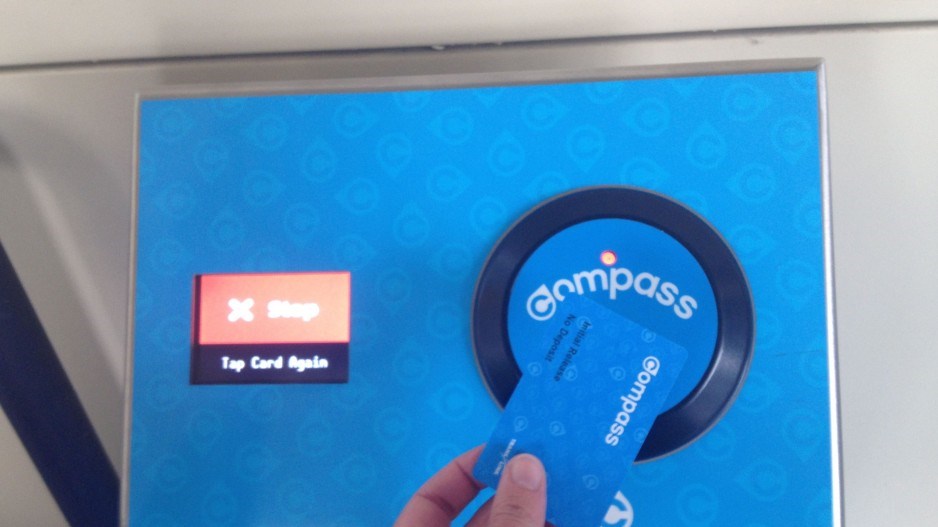TransLink’s acting CEO says the long-awaited, much delayed Compass card roll out is finally ready — but it took some dramatic tinkering with Metro Vancouver’s transit system to make it happen.
“By the end of October, customers will be able to buy compass cards from our vending machines and on the website, just in time for the November passes,” said TransLink’s chief financial officer and acting CEO Cathy McLay.
Fare gates to SkyTrain and Canada Line stations, which have been in place but inactive since 2012, will likely become operational around the same time, meaning transit riders will need a Compass card in order to open the gates.
The budget for the project has nearly doubled since it was originally announced, from $100 million to $194 million. San Diego-based Cubic was contracted to design and implement the system.
The transportation authority has done away with separate fare zones for buses, meaning that suburban commuters who normally would pay higher zones to ride two or three zones will now pay the same fare across the board.
However, the zone system will still be in effect for SkyTrain, Canada Line and WestCoast Express passengers. Fares will not go up for any of the zones.
The reason is the “tap out” function of the Compass card. When passengers board a bus or enter train fare gates, they are expected to tap their card against a magnetic card reader which registers they have paid their fare. They are then supposed to tap out when leaving stations or getting off a bus.
But TransLink found persistent problems with customers tapping off of buses.
“My experience using the Beta testing [for the Compass card] is that there really is a problem using tap out on a bus,” said Gordon Price, director of Simon Fraser University’s city program and an advocate for both transit and TransLink.
“It’s a different experience when you’re prepared to tap out after you’ve left a train and you go through a fare gate."
Price explained that while SkyTrain passengers don't tap out until they are exiting the stations at a fare gate, bus riders were expected to tap out when they exited a bus at a bus stop, causing stress especially on crowded buses.
"[You’re worried about] is the bus going to leave? And it just gets ugly.”
Bus drivers had also told TransLink the tap out requirement was not safe for passengers, McLay said.
While Price said he assumed eliminating zones for buses would mean TransLink would take a revenue hit, McLay said TransLink is predicting the reduced cost of a multi-zone bus ride will lead to increased ridership.
“Today over 80% of all bus routes are one zone anyway. What we do know is that that people will have a choice. They can take the buses, which are much slower than our rapid transit system. We think by offering the one zone on buses, it will increase ridership,” McLay said.
“On net we think it will all balance out.”
But in the wake of the defeated transit plebiscite, which denied the transit authority a 0.5% sales tax to be dedicated to transportation improvements, there is no money in the system to add buses to accommodate that increased ridership, McLay said. TransLink does anticipate to be able to “optimize” routes based on increased information gleaned from Compass card use.
Transit riders who transfer from a bus to the SkyTrain will be automatically charged the correct fare through scanning their Compass card at the entrance and exit of SkyTrain systems. They will be able to buy Compass cards at vending machines at SkyTrain stations and SeaBus terminals this month and, by November, at retail outlets and by mail. Customers will be able to use an online system to put more money on their card.
Faresaver tickets will likely be phased out by 2016, but TransLink does not yet have a firm date for stopping the sale of those tickets.
Even with the tap out function removed for buses, TransLink staff said they will be able to get useful data about how people use the transit system by aggregating and analyzing tap-in data. That data does not contain any personal information about passengers.
If TransLink manages to successfully introduce the new system to the public with no more delays, it will be a rare triumph for the agency which has struggled with poor public perception, several SkyTrain shutdowns over the past year and no indication of where money for future transit improvements will come from following the failed transit plebiscite.
Earlier this week, the minister newly put in charge of TransLink, Peter Fassbender, said TransLink should suspend its search for a new CEO while it deals with these issues. TransLink fired its CEO, Ian Jarvis, in February in a bid to restore confidence. Its temporary CEO, Doug Allen, is set to finish his term on August 10.
@jenstden




